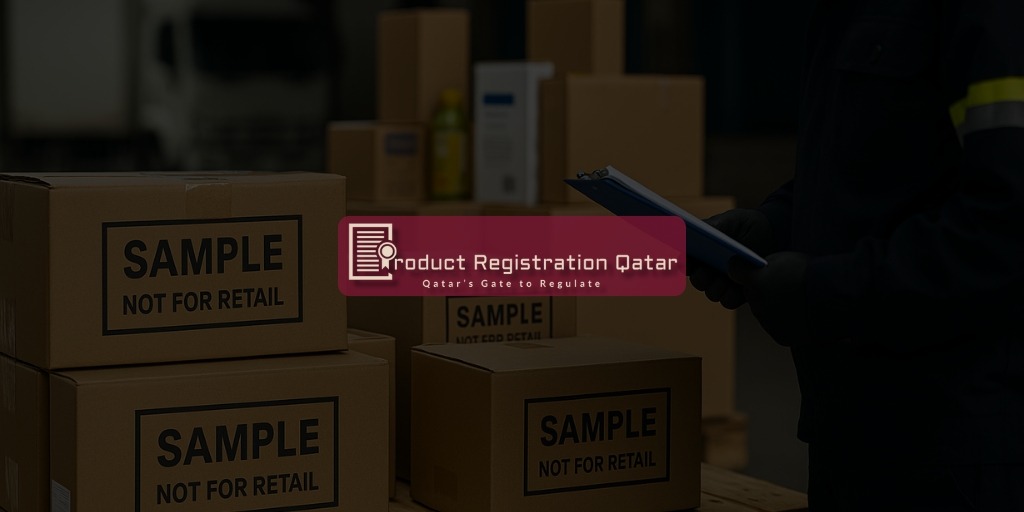Qatar Sample Import: Avoid Holds, Protect Launches
Planning a trade-show drop? Master Qatar sample import documents, Arabic labeling, and HS/GTIN alignment to clear customs and keep your demo on schedule.
BLOGS
10/29/20253 min read


Qatar Sample Imports for Trade Shows & Demos:
Avoid Holds, Protect Launches
Planning a live demo or trade-fair showcase in Doha? “Sample” shipments can move faster—but only when they’re clearly non-retail and aligned across labels, invoices, and declarations.
Without this alignment, Customs and the Ministry of Public Health (MoPH) may treat your goods as retail imports—triggering detentions, clarifications, or even destruction orders.
This guide explains how to avoid such costly setbacks while keeping your brand visible in Qatar’s high-value events.
What Counts as a “Sample” in Qatar (Non-Retail Use Only)
Batches intended solely for trade fairs, distributor demos, lab evaluations, influencer previews, or training sessions—not for sale.
Quantities must stay limited. For example, mixed variants or non-retail containers signal the shipment’s temporary nature.
Markings and outer labels should clearly read sample/non-retail use only. Even outer packaging, invoices, and airway bills must repeat that statement.
Compared to full MoPH registration, samples are a temporary entry permission, not an exemption. They show intent to comply later under full registration, not to bypass it.
Always maintain documentation that shows when, where, and for what event the samples will be used.
Roles & Responsibility (Brand, Local Partner, Customs/MoPH)
Importer/Authorized Local Party: A Qatar-based company or distributor must usually act as importer of record. This party should handle correspondence, approvals, and event documentation.
Brand/Manufacturer: Supply composition sheets, spec sheets, and label mockups aligned with your planned market release. Inconsistencies between sample and final product often delay future approvals.
Customs/MoPH: Authorities cross-check HS codes, product categories, and label claims. Mismatches between documentation and actual product presentation commonly trigger lab referrals or rejection.
Event Organizers: When possible, have event organizers provide written confirmation that the shipment is for demonstration purposes. Such letters can expedite Customs clearance.
Documents & Evidence to Review
Invoices & Packing Lists: Use clear wording such as Samples for exhibition/demo – no commercial value, not for retail sale. Avoid retail-looking per-unit pricing or discounts.
Certificates & Proofs: Attach product safety certificates, ingredient declarations, or quality statements that support the product’s integrity without implying retail sale.
Quantities vs. Purpose: Ship only what is required for display or testing. If you send more than is reasonable for a demo, Customs will question the purpose.
Sensitive Categories: Cosmetics, supplements, disinfectants, food, and borderline therapeutic goods face added scrutiny. Keep active ingredients and warnings transparent.
Cold-Chain Items: Always include temperature data loggers, expiry dates, and cold-handling notes. Missing this evidence is among the top causes of detentions.
Top Triggers for Holds & Lab Referrals
Retail signals: Price stickers, retail barcodes, or missing Arabic elements on primary or secondary packaging.
GTIN/HS code mismatch: If your declared HS code does not reflect the true category, Customs can refer the shipment for reclassification.
Unsubstantiated claims: Avoid strong commercial wording like “clinically proven” or “instant results” unless evidence is submitted.
Oversized lots: Multiple variants or repeated SKUs that look like retail stock instead of sample kits.
No local consignee: Shipments addressed to an event hall or hotel instead of an authorized importer often face automatic holds.
How We De-Risk Your Sample Shipments
Pre-screen labels and claims to ensure alignment with MoPH and Qatar Customs expectations.
Cross-check HS codes, GTINs, and technical documents with intended usage declarations.
Prepare supportive paperwork: sample purpose letters, event confirmations, and importer declarations that verify non-retail use.
Coordinate with authorities: We liaise with Customs and MoPH to anticipate queries before arrival, saving your shipment from unnecessary delays.
If a lab referral occurs, we prepare a clear evidence package—including composition sheets, purpose letters, and importer correspondence—to accelerate release.
Our approach protects your launch timeline, ensuring event visibility and market presence even before full approval.
When to Use Samples Strategically
Distributor onboarding: Offer controlled samples that let partners study texture, fragrance, or usability while ensuring documentation readiness.
Trade-show exposure: Let visitors experience the product without needing retail packs or pricing.
Product testing and feedback: Use early trials to gather market input, then apply insights in your MoPH registration dossier.
Regulatory relationship building: Properly documented samples demonstrate professionalism and readiness for full compliance.
Bottom Line
Samples can be powerful marketing tools when handled correctly—but a compliance slip can turn opportunity into setback.
By treating samples as controlled trial entries, brands can collect feedback, secure distributor confidence, and prepare for full registration without risking MoPH penalties or Customs holds.
Ready to plan your next compliant demo drop?
Share your product list and intended use—contact us or use our chatbot in the bottom right corner to structure a risk-free, timely shipment that paves the way for your successful launch in Qatar.
Related Reads
Learn how accurate labeling prevents regulatory holds in Qatar Labeling Rules for MoPH Product Registration (2025) to strengthen your sample documentation.
Discover how Correct Product Classification in Qatar (2025 Guide) can reduce Customs and MoPH misclassification risks for temporary imports.
See how Government Liaison Services in Qatar streamline communication with authorities to secure faster sample clearance and event readiness.
Read our guide on MoPH classification Qatar to spot hidden triggers that cause delays or reclassification.
Check our Qatar ecommerce compliance guide to keep your online listings MoPH-safe.
Ready to Ensure Your Product is Fully Compliant?
Fill out the form below and let our experts guide you through label checks, formula validation, and registration—step by step.


